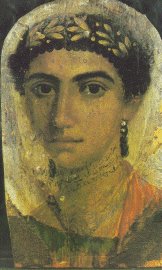Ante Diem X Kalendas March

Modern Date : February 20th
Ante Diem X Kalendas March
Tenth Day to the Kalends of March
This is one of the dies comitiales when committees of citizens could vote on political or criminal matters.
The Parentalia continued this day, and was a celebratory period in which ancestors were honored. It lasted from February 13 through the 21st. The temples would all be closed during this period. Offerings of small amounts of wine, bread, a sprinkling of salt, or flowers were made at the tombs.
February is a month sacred to the gods Mars (as Quirinus, or Romulus) and Juno, the wife of Jupiter. It is also a month in which particular reverence was shown to the spirits of deceased ancestors. This was a month devoted to fertility, both of men and women, and of the land, and celebration of the coming Spring.
Butter Week
In Russia, the week before Lent is known as the "Butter Week." In the 19th century, the rich celebrated by bundling in furs and traveling by troika to their summer cottages where they could skate on the frozen rivers and picnic in the snowy woods, sipping on vodka and eating blinis. In the city of St. Petersburg, the Tzar put on a spectacle for the public each of the seven days. Everyone ate blinis, and topped them with butter, caviar, herrings or salmon.
St Wulfric
Feast day of St Wulfric (Ulric; Ulrick; Ulfric) of Haselbury, England. His life or legend, is a testament to what I call the insainity of faith. Wulfric's abuse of his body can, in my view, only be attributed to a sick mind that wished to be extinguished. Given that it is a mortal sin to commit suicide in the Christian faith, looking over Wulfric life, one wonders if he did what he did because he couldn't take his own life.
St Wulfric, who died in 1154, was born near Bristol, England. He became a priest, and kept dogs and hawks for sport, till he met a beggar who asked for alms. When Wulfric said he didn't know if he had anything to give, the beggar said “Look in thy purse, and you shall find twopence halfpenny.” He found as he was told and gave it to the beggar, who prophesied that Wulfric would become a saint.
He became a hermit, fasting often. “His daintiest food was oaten-bread and water-gruel”, wrote a chronicler. Those who sought his advice had to knock on his window and converse with him through the window of his cell.
Wulfric never slept unless he could not stay awake, and slept leaning against a wall. Waking up, he would chastise his body for being so lazy. After a hair-shirt became too comfortable, he changed it for an iron coat of mail. In winter he sat in a tub of cold water reciting psalms.
He shortened his coat of mail, distributing the small rings of metal to the people, and they were cured by the metal. It was even said that he cut the chain mail with scissors as if it were linen. Envying such rare goodness, a demon attacked him till the apparition of a virgin stopped it.
The joints of his iron coat dissolved and it miraculously fell down around his knees. Upon this he said he would die on the following Saturday, and this indeed came to pass. Or, so it is said.
He is venerated at Haselbury Plucknett (mentioned in the 11th century Domesday Book as Halberge, meaning ‘the hazel tree hill’, from the Old English haesel and beorg; the suffix was acquired later when it was held by Alan de Plugenet c.1265), Somerset, UK, where he is buried in the cell in which he lived, which is now the site of the church's vestry.
Wulfric had the gift of prophecy and predicted the death of King Henry I of England. He also foretold that his own death and burial would cause conflict, and as if to make the prognostication come true, the Cistercians laid claim to Wulfric’s relics, as did the monks of Montacute Priory, who had been feeding him and attempted to seize his body by force. However, the saint was unaffiliated with any religious order. Wulfric was a very popular saint during the Middle Ages, and his tomb was visited by many pilgrims.

0 Comments:
Post a Comment
<< Home